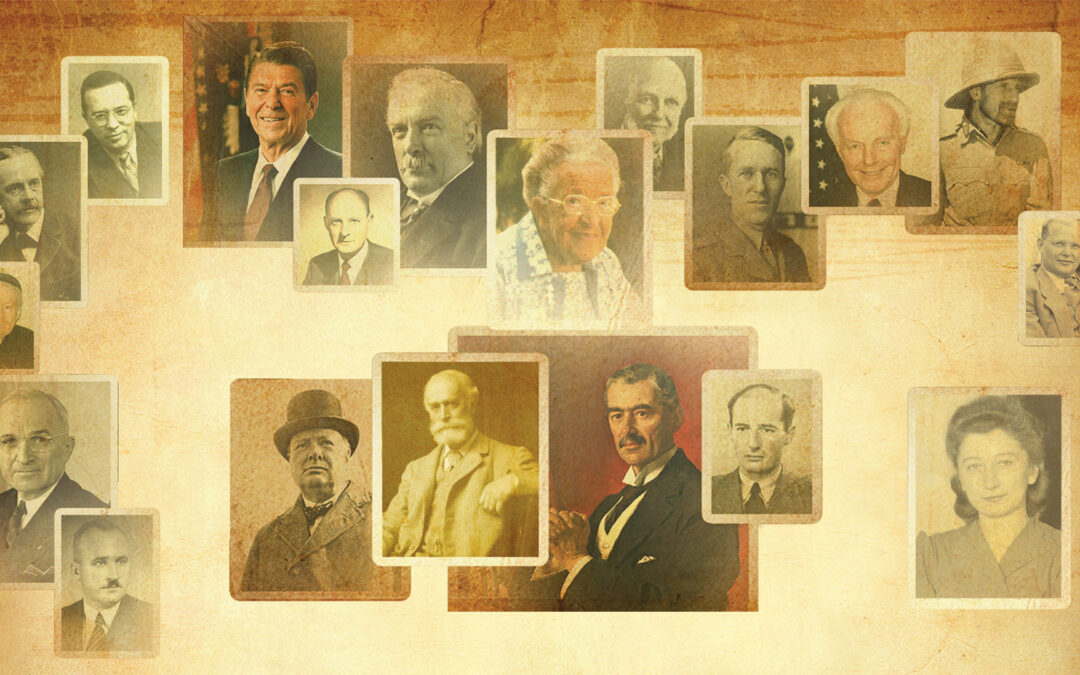“Christian Zionism” is defined as the support of the return of the Jewish people to Zion (Jerusalem or Israel) by Christians. These Christians recognize and celebrate the Biblical covenant in which God promised certain lands to Abraham and his descendants—forever. This divine land grant, called the Promised Land (or the Land), would be theirs for all time. Since God’s decree, there has always been a presence of Jewish people in the Land, but they did not always rule it or maintain it as the State of Israel. That began to change in the nineteenth century.
The contemporary outpouring of support for the belief in a home- land for the Jewish people surged to the forefront of British foreign policy in the 1800s. It was spread from there to the United States by those who believed in a literal interpretation of the Holy Scriptures: William Blackstone, Cyrus Scofield, Dwight L. Moody, John Nelson Darby, Professor George Bush, and other noted Bible scholars—men about whom much will be written in later articles.
First, the Blackstone Memorial and then the Balfour Declaration began to influence noted politicians who were forced to take a stand—for or against God’s Chosen People. After a decades long battle for the right to possess their original God-given grant, David Ben-Gurion stood before a microphone on May 14, 1948, and declared the rebirth of the State of Israel in Palestine. United States President Harry Truman was the first foreign head of state to acknowledge the new nation, and other heads of states took up the gauntlet to ensure that Israel would survive.
Over the past two centuries, Zionism was sometimes rumored to be a cause generally espoused only by the Jews that Gentiles sometimes supported. Christian Zionism was seen by some as an attempt to force the Jews to accept a homeland as a refuge from anti-Semitism. A hand held out in friendship to the Jewish people was often thought to be a ruse and therefore unreliable.
Christian Zionism preceded Theodor Herzl, and the vast majority of Zionists worldwide were not Jewish.
Prior to the late nineteenth century, blueprints for a Jewish homeland in Palestine had been outlined by Christians. Based on Biblical prophecies, the plans were frequently built on the idea that, Palestine had been deeded to the Jews by God Almighty.
Many European rabbinical groups in the early twentieth century were against Palestine as a location for Jewish settlement. They based their opinions on a belief that deliverance for the Jews would come only through Yahweh’s intervention. This suspicion came not only from Orthodox rabbis but from Reform rabbis as well, for entirely different reasons. The fear was that any progress made in achieving social acceptance in either Europe or the United States would be lost.
Some of the Christian-inspired plans for a Jewish homeland in Palestine had emerged as far back as the seventeenth century. When Herzl introduced Jewish Zionism in 1896 in his book, The Jewish State, alliances with Christian Zionists were rapidly formed. In the Bible Land, colonies sprang up in support of Jewish reclamation. The George Washington Adams colony in Jaffa, Clorinda Miner’s colony in Artas, and the German Templars colony in Haifa, Jaffa and Sarona were excellent instances of bravery and industry. It is thought that those colonies were the first true developments in the region.
Central to Christianity is the idea of a Promised Land with the narrative coming from the Hebrew Bible and God’s promise to Abraham’s seed. Some believe Christians were responsible for developing the idea of Palestine as the Holy Land, when in reality the land was given to Abraham by Jehovah. It was an unbreakable covenant.
God again spoke to Abram: “Lift your eyes now and look from the place where you are—northward, southward, eastward, and westward; for all the land which you see I give to you and your descendants forever. And I will make your descendants as the dust of the earth; so that if a man could number the dust of the earth, then your descendants also could be numbered. Arise, walk in the land through its length and its width, for I give it to you” (Genesis 13:14-17).
After this land grant was bestowed upon him, Abram’s name was changed to Abraham, for God had declared that His servant would be “a father of many nations.” At the same time, He changed Sarai’s name to Sarah (princess), and announced that she and Abraham would have a son, Isaac. The news must have come as a great shock to both, as they were already well past their childbearing years. The covenant between God and Abraham would pass to Isaac and through him to Jacob, and to future descendants.
While much has been said in modern times about the Jews fleeing to Palestine for safety from persecution, pogroms, and the Holocaust, Abram was certainly not a refugee running for his life when sent forth in search of God’s Promised Land. He had no need. He was wealthy and well respected in Ur. He went in faith only because God told him to go. It is important to note that the land given to Abraham and his descendants was a relatively small area when compared to that occupied by Arab tribes. It is also notable that neither loss of their homes nor exile because of rebellion and disobedience had any effect on God’s promise of ownership of the land. The Bible does not indicate that the Jewish people had any desire to increase the area God had defined for them to occupy.
God renewed His covenant with Isaac and again with Jacob. The Torah—the first five books of the Old Testament and Moses’ record of the travels of Abraham’s descendants— shows their steady march toward the Promised Land. When Moses led the exodus of the children of Israel out of bondage in Egypt, the group had grown from less than one hundred to more than 600,000 men, plus an untallied number of women and children. Standing atop Mount Nebo in western Jordan, Moses reiterated the boundaries God had set for the Promised Land.
When the nation of Israel was reborn on May 14, 1948, it was evidence of God’s fidelity to His Word and a clear statement that there is, indeed, hope and redemption available for this world. He said so in His Word and cannot lie:
God is not a man, that He should lie, Nor a son of man, that He should repent. Has He said, and will He not do? Or has He spoken, and will He not make it good? – Numbers 23:19
The claim of the Jewish people to Zion has been reinforced by archaeological discoveries: A Hebrew University archaeologist discovered a Jerusalem city wall from the time of King Solomon and said the finding “is the first time that a structure from that time has been found that may correlate with written descriptions of Solomon’s building in Jerusalem.” Artifacts found inside excavations around the City of David and within the Old City, the Temple Mount, and Solomon’s Stables date the Jewish presence in Jerusalem as far back as 1000 BC, during the time of King David.
The utter necessity of a homeland for the Jewish people was undeniably demonstrated when the most horrific event to date—the Holocaust—was launched in Europe during World War II. Adolf Hitler began his systematic and brutal attempts to annihilate the Jewish race. The question of a safe haven became not just a wish, but a critical issue for the preservation of a people who began to seek refuge in their ancient homeland of Palestine.
While battling for a place to call their own, men like David Ben-Gurion stood toe-to-toe against both the British who executed the mandate in Palestine, and with the Arab inhabitants fighting the creation of a Jewish state. By the grace and hand of God, Ben-Gurion and his supporters prevailed. On May 14, 1948, the British withdrew from Palestine, and the State of Israel was reborn.
Since that momentous date, Israel has had to fight for her life—not once but multiple times. Joining the Jewish people in the trenches were sympathetic Gentiles from around the world. With each succeeding battle for existence, new Christian Zionist organizations have sprung up to stand with the children of Israel in their battle to survive.
I am proud to call myself a Christian Zionist—a person who believes that the return of the Jewish people to Israel and the establishment of the State of Israel in 1948 was a fulfillment of prophecy. Christian Zionists may differ on their political views but not on this Biblical view. The one Scripture that unites them all is Genesis 12:1–3, which ends with this promise to Abraham: “I will bless them that bless thee, and curse him that curseth thee.”







